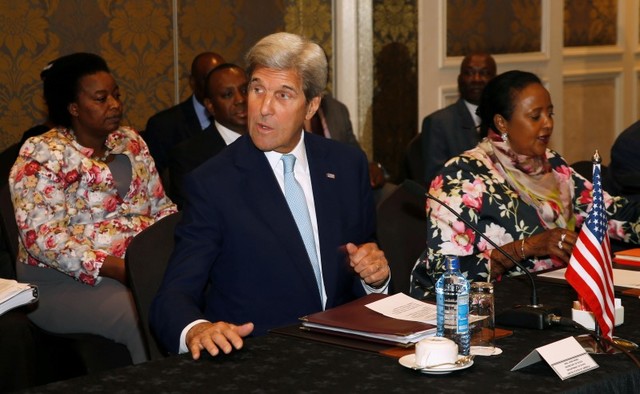U.S. seeks progress in deploying new U.N. troops to South Sudan

By Reuters
U.S. Secretary of State John Kerry said on Monday he and regional states were committed to giving momentum to the planned deployment of extra U.N. troops to South Sudan and said the country’s leaders needed to recommit to a peace deal.
Fierce fighting in the capital Juba last month has raised fears that the five-year-old nation could slide back into civil war. It prompted the United Nations to authorise the deployment of 4,000 additional U.N. troops to bolster a U.N. mission there.
“We need to move forward with the deployment of a regional protection force,” Kerry told a news conference in Nairobi after talks with foreign ministers from Kenya and other African states that had focused on South Sudan and Somalia’s reconstruction.
Kerry said regional states, which have pushed for sending the new troops to help South Sudan’s 12,000-strong U.N. mission UNMISS, had agreed on “the immediate implementation process” of meetings and steps to “guarantee some momentum builds up.”
About two years of conflict that pitted troops loyal to President Salva Kiir against those of his former deputy Riek Machar was supposed to have ended with a peace deal last year. But fighting persisted and flared again last month in Juba.
After the latest violence, Machar, who had returned to the capital in April to resume his post as vice president, withdrew again to the bush and was picked up this month by U.N. peacekeepers in Democratic Republic of Congo with a leg injury.
Kiir has again sacked him and appointed a new vice president.
Kerry said it was up to South Sudan’s leaders, political parties and neighbours to work out “what is best or not best with respect to Machar”, but all sides had to stop fighting.
“We urged all the parties to recommit in word and deed to the full implementation of the peace agreement,” Kerry said.
Kenyan Foreign Minister Amina Mohamed, speaking at the same news conference, said the new U.N. force should be deployed “sooner rather than later” but said it could be sent gradually.
South Sudan’s government initially said it would not cooperate with the new U.N. troops which will be under the command of the 12,000-strong UNMISS mission. But since then it has said it was still considering its position.
“We have not rejected it or accepted it. The sovereignty of the people of South Sudan will be decided by the parliament,” South Sudan’s presidential spokesman Ateny Wek Ateny said.
World powers and regional states have struggled to find leverage over South Sudan’s warring factions despite U.S. and European sanctions on some military leaders and African threats of punitive actions.
South Sudan secured its independence in 2011, but by December 2013 the longtime political rivalry between Kiir, an ethnic Dinka, and Machar, a Nuer, had led to civil conflict that often followed ethnic lines.
The fighting has killed thousands of people and driven more than 2 million people from their homes, with many of them fleeing to neighbouring states.
Kerry, who pledged new humanitarian aid to South Sudan worth $138 million, said the new U.N. troop contingent was “not an intervention force” but would protect civilians and support those working to ensure peace prevailed.
In the latest flare-up in July, Washington was particularly concerned by an attack on a Juba hotel by uniformed men who killed a U.S.-funded journalist and raped civilians, including aid workers.
The U.N. has launched an investigation into accusations U.N. peacekeepers in Juba failed to respond properly to the attack.
South Sudanese government officials say that just because the perpetrators were in uniform did not mean they were either under the command of the government or the opposition.